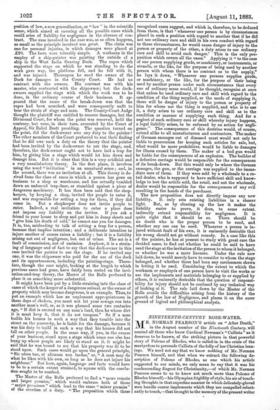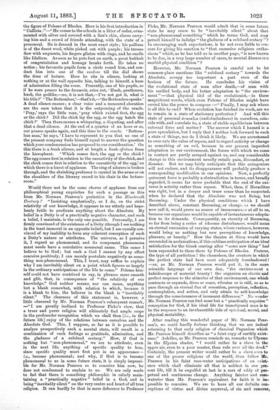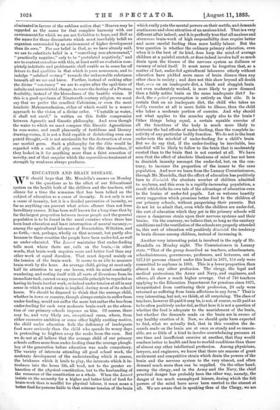NINETEENTH - CENTURY ROSE - WATER.
/UR. NORMAN PEARSON'S article on "After After Death," _—/iL in the August number of the Nineteenth Century, will remind all those who know Cardinal-Nevrman's " Callista" as it deserves to be known, of the striking picture in that powerful story of Polemo of Rhodes, who is called-in in the crisis of the martyrdom to persuade Callista of the folly of her Christian lean- ings. We need not say that we know nothing of Mr. Norman Pearson himself, and that when we extract the following de- scription of Polemo of Rhodes, as one which his article suggested to our minds, we only mean to say that it was his condescending disgust for Christianity,—of which Mr. Norman Pearson seems to us to know not much more than Polemo of Rhodes himself,—his Olympian frigidity of style, his air of touch- ing thoughts in that superfine manner iu which delicately-gloved. men handle coarse implements which they are compelled reluct- antly to touch,—that brought to the memory of the present writer the figure of Polemo of Rhodes. Here is his first introduction in " Callista :"—" He comes to the schools in a litter of cedar, orna- mented with silver and covered with a lion's akin, slaves carry- ing him and a crowd of friends attending, with the state of a proconsul. He is dressed in the moat exact style; his pallium is of the finest wool, white picked out with purple; his tresses flow with unguents, his fingers glisten with rings, and he smells like Idalinm. As soon as he puts foot on earth, a great hubbub of congratulation and homage breaks forth. He takes no notice ; his favourite pupils form a circle round him, and con- duct him into one of the exedra° till the dial shows the time of lecture. Here he sits in silence, looking at nothing or at the wall opposite him, talking to himself, a hum of admiration filling the room. Presently, one of his pupils, as if he were praeco to the daumvir, cries out, Hush, gentlemen, hush, the godlike,—no, it is not that,—I've not got it, what is his title ?" The Bottomless,'—that's it,—'the Bottomless speaks.' A dead silence ensues; a clear voice and a measured elocution are the sure token that it is the outpouring of the oracle. ' Pray,' says the little man, ' pray which existed first, the egg or the chick ? Did the chick lay the egg, or the egg hatch the chick ?' Then there ensues a whispering, a disputing, and after that a dead silence. At the end of a quarter of an hour or so, our praeco speaks again, and this time to the oracle. ' Bottom- less man,' he says, ' I have to represent to you that no one of the present company finds himself equal to answer the question which your condescension has proposed to our consideration: On this there is a fresh silence, and at length a fresh datum from
the hierophant. Which comes first, the egg or the chick ? The egg comes first in relation to the causativity of the chick, and the chick comes first in relation to the causativity of the egg,' on which there is a burst of applause. The ring of adorers is broken through, and the shrinking professor is carried in the arms or on the shoulders of the literary crowd to his chair in the lecture- • room."
Would there not be the same chorus of applause from our philosophical young exquisites for such a passage as this from Mr. Norman Pearson's prelection in the Nineteenth Century ? " Insisting emphatically, as I do, on the strict relativity of our knowledge, it appears to me utterly and hope- lessly futile to predicate anything about the Absolute. My belief in a Deity is of a practically negative character, and such a belief, I maintain, is the only one possible. Personally, I am firmly convinced of the existence of a Deity (though I see nothing in the least immoral in an opposite belief), but I am equally con- vinced of my inability to form any coherent conception of such a Deity's nature or attributes. The universe, as I perceive it, I regard as phenomenal, and its component phenomena must needs have a correlative noumenal cause. This cause I believe to be God ; but such a God I cannot by any effort conceive positively, I can merely postulate negatively as some- thing non-phenomenal. This, I trust, may suffice to explain why I am inevitably silent on a point which figures so largely in the ordinary anticipations of the life to come." Polemo him- self could not have contrived to say, in phrases more smooth and glib, that, in consequence of "the relativity of our knowledge," God neither means, nor can mean, anything but a blank somewhat, with relation to which, because it is a blank to him, the believer in the blank is "inevitably silent." The clearness of this statement is, however, a little obscured by Mr. Norman Pearson's subsequent remark, —"I am greatly inclined to Professor Fiske's view, that a truer and purer religion will ultimately find ample scope in the profounder recognition which we shall then [i.e., in the future life] enjoy of the relations between ourselves and the Absolute God. This, I suppose, so far as it is possible to analyse prospectively such a mental state, will result in a combination of such feelings as gratitude, admiration, and the gladness of a subdued ecstacy." How, if God is nothing but " non-phenomenal," we are to attribute, even in the next life, anything of specific quality to him, since specific quality must first put in an appearance — i.e., become phenomenal; and why, if God is to become phenomenal to us in some future state, it is simply impossi- ble for Mr. Norman Pearson so to conceive him now, he does not condescend to explain to us. We are only made to feel that there is something philosophic in calmly main- taining a " practically negative " belief in a God, and in being "inevitably silent" on the very centre and heart of all true religion. It can hardly be that in mere deference to Professor
Fiske, Mr. Norman Pearson would admit that in some future state he may cease to be "inevitably silent" about that "non-phenomenal something" which he terms God, and may permit himself to indulge "the gladness of a subdued ecstacy " ? In encouraging such expectations, is he not even liable to cen- sure for giving his sanction to "that excessive religions enthu- siasm " which, as he has told us in another page, "is now known to be due, in a very large number of cases, to mental disease or a morbid physical condition " ?
However, Mr. Norman Pearson is careful not to let common-place emotions like "subdued ecstacy " towards the Absolute, occupy too important a part even of the horizon of the future. He concludes his vision of the evolutional state of man after death,—of man with his rarified body, and his better adaptation to "the environ- ment "— that physical idol of the evolutionist, —in these magnificent words, which even Polemo of Rhodes might have envied him the power to compose :—" Finally, I may ask where is all this to end? When evolution has finished its work, are we to remain in a state of stationary perfection ? And will this state of personal cirdepoef,tes (undisturbedness) in ourselves, coin- cide with, and correlate to, a state of stable equilibrium between external force and matter P The answer which I hazard is a pure speculation, but I reply that I neither look forward to such a state of things, nor do I think it likely. We are accustomed to over-rate the value of repose, and to regard activity or change as something of an evil, because in our present imperfect adaptation to our environment, the forces with which we come in contact are partly arrayed against us, and any considerable change in this environment usually entails pain, discomfort, or disaster. But we may fairly anticipate that this antagonism will not endure, and its disappearance will probably produce a corresponding modification in our opinions. Now, a perfectly quiescent force is probably a contradiction in terms, and broadly regarded; it seems far more probable that the end of the uni- verse is activity rather than repose. What, then, if Heraclitns was right, but in a deeper and truer sense than he suspected, when he declared that the Absolute was not Being, but Becoming. Under the physical conditions which I have described above, constant Becoming, or change, as we should now call it, would prove no source of inconvenience at all to us, because our organisms would be capable of instantaneous adapta- tion to its demands. Consequently, an eternity of Becoming, so far from being a series of irksome disturbances, would mean an eternal succession of varying states, whose variance, however, would bring us nothing but new perceptions of knowledge, pleasure, or beauty." How the theatre at Sicca would have resounded in acclamations, if this sublime anticipation of an ideal satisfaction for the Greek craving after "some new thing" had been expounded to them there by Polemo of Rhodes. Protens, the type of all perfection ! the chameleon, the creature in which the perfect state had been most adequately foreshadowed ! —or, as Mr. Norman Pearson would put it, in the more scientific language of our own day, "the environment a kaleidoscope of material beauty ! the organism an elastic and perfect response to the stimulus of that environment, one which contracts or expands, dives or soars, vibrates or is still, so as to pass through an eternal flux of sensation, perception, reflection, contemplation, and action, and only attain to self-knowledge
through the consciousness of incessant difference." No wonder Mr. Norman Pearson can find none but a " practically negative "
conception for God, if his ideal life for transfigured man is to be the response to an inexhaustible tide of spiritual, moral, and physical mutability.
After reading this wonderful paper of Mr. Norman Pear- son's, we could hardly forbear thinking that we are indeed returning to that early religion of classical Paganism which Mr. Pearson himself describes as "a faint copy of earthly exist- ence." Achilles, as Mr. Pearson reminds us, remarks to Ulysses
in the Elysian shades, " I would rather be a slave in the upper air, even to a poor master, than rule over all the dead." Certainly, the present writer would rather be a slave even to one of the poorer religions of the world, than follow Mr. Pearson in his faint rose-water anticipations of an exist- ence which shall eliminate all that is noblest in our pre- sent life, till it be engulfed at last in a sort of eddy of per- petual and continuous change. Anything fainter and rose- waterier than Mr. Pearson's equivalent for faith it is im- possible to conceive. We are to have all our definite con- ceptions of virtue and divine approval, of sin and remorse, eliminated in favour of the sublime notion that "Heaven may be regarded as the name for that complete harmony with our environment for which we are not forbidden to hope, and Hell as the name for those discomforts which must inevitably befall an organism surrounded by an environment of higher development than its own." For our belief in God, as we have already said, we are to substitute belief in a "something non-phenomenal," "practically negative," only to be "postulated negatively," and are to content ourselves with this, at least until an evolution com- pletely indefinite and problematic shall enable us in some far-off future to find qualities in that which is pure noumenon, and to indulge "subdued ecstacy" towards the unknowable substance beneath all we see and know. Further, instead of seeking after the divine " constancy " we are to aspire after the opal-tints of infinite and unrestricted change, to crave the destiny of a Protean flexibility, instead of the blessedness of the beatific vision. If this is a good specimen of Nineteenth-century religion, we must say that we prefer the cruellest Calvinism, or even the most fatalistic Mahommedanism, either of which would be a nearer approach to the vision of a divine order. "Unstable as water, it shall not excel," is written on this feeble compromise between Agnostic and Gnostic philosophy. And even though the water to which we must compare this Gnostic Agnosticism be rose-water, and smell pleasantly of fastidious and literary drawing-rooms, it is not a fluid capable of disinfecting even one putrid thought,—it is not serviceable for the destruction of even one morbid germ. Such a philosophy for the elite would be regarded with a smile of pity even by the elite themselves, if they looked in it for anything more than a faint sensation of novelty, and of that surprise which the supercilious treatment of strength by weakness always produces.




































 Previous page
Previous page